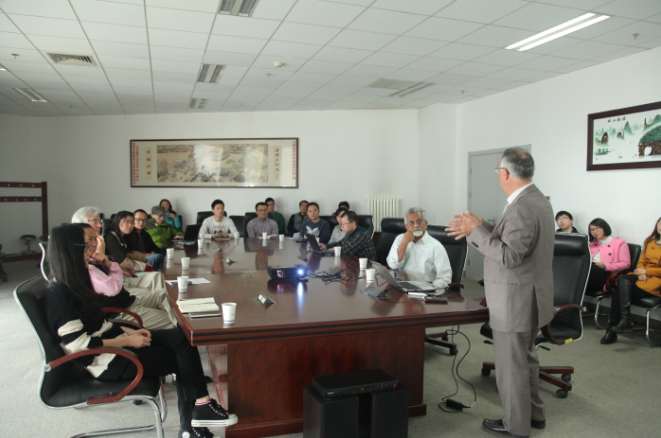Mr. Benjamin Schreiber, Industrial Policy Manager of the European Space Agency (ESA) during 1987-2015 visited HIST in the morning of 10 April 2015.
Mr. Schreiber has an educational background in nuclear engineering and physics. He also has an MBA (Master in Business Administration) as well as a Diploma in Aerodynamics. This unique mix of scientific disciplines directly linked to space explorations and technologies and a sound knowledge of business processes and practices has enabled Mr. Schreiber to bring interesting competencies such as cost engineering to help ESA to plan and execute its programs and operations in an efficient and cost-effective manner.
In a presentation he delivered to HIST and AIR staff as well as representatives of international groups such as ISDR that have their Offices in AIR, Mr. Schreiber clearly spelt out the differences between ESA and the European Union (EU). ESA is a Membership organization that includes Canada, a non-European State. In addition it included many other countries such as Switzerland and Norway which though they are geographically and culturally within Europe are not part of the EU.
He provided detail explanations on many of the policies and practices of ESA and highlighted significant differences between ESA’s working modalities and that of other western country space agencies, particularly NASA and other US based institutions. ESA’s activities are much more oriented towards civilian and commercial interests than its counterparts in the USA which have considerable military applications. ESA operates on the basis of a principle of “fair return” for its Members. Each ESA Member is expected to recover as much as 95% of its contributions to ESA budget over a period of 5 years through the participation of its public and private sector institutions bidding for and executing specific ESA programs and initiatives.
ESA and UNESCO established an Open Initiative for Co-operation among Space Agencies for the implementation of the World Heritage Convention in 2003. The Chinese Academy of Sciences became a partner of the Open Initiative in 2008 and then established HIST for promoting space technology applications for the conservation, management, monitoring and sustainable development of UNESCO designated places. HIST has worked closely with some of the ESA Member States, such as Germany, in the implementation of specific projects, particularly to obtain SAR images for some of its partnership projects in countries such as Cambodia. During 2015, HIST representatives will attend intergovernmental meetings of the MAB Program and the World Heritage Convention in June-July 2015 where discussions for reviving and further strengthening the UNESCO-ESA Open Initiative are foreseen. HIST as the only UNESCO Category 2 Centre entirely dedicated to space technology applications could play a significant role in enabling the UNESCO-ESA Open Initiative to deliver targeted benefits for less developed Member States of UNESCO on space technology applications for the conservation, management, monitoring and sustainable development of UNESCO designated places.

Mr.Benjamin Delivering the Speech
 Conference Scene
Conference Scene
